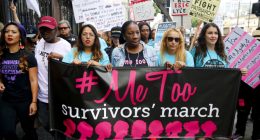Ministers have squandered a chance to make real change for the millions facing policing, housing, health and education inequalities
Every so often it pays to look in the mirror. Who are we as a country? What do we look like? And then perhaps to look at the mirror itself. Is the reflection a true one?
The government has been given that opportunity after being obliged to respond to the issues and assertions raised by the Commission on Race and Ethnic Disparities released last March, otherwise known as the Sewell report.
It called for reflection on a massive scale. The Sewell report, we should not forget, was a response to the biggest and longest race protest in the UK in recent memory. It was also the most divisive, inaccurate and politically driven race equality report ever written.
With Sewell and his allies having failed to grasp the moment, and ministers mindful of the huge public backlash to the report having adjudicated, how should we see ourselves? In marginally better shape, perhaps. But in terms of equality, anti-racism and life chances, no one can plausibly say we are in good health.
There is good news. Let’s start with that. For the first time, the government has acknowledged that Black and Asian communities, who are some of the poorest in the north of England, could be beneficiaries of levelling up. It’s not much. But it suggests a dilution of the culture wars approach that said ‘taking the knee”, for example, is somehow against the interest of white working-class people.
How much of that recalibration is due to the fact that the driving force behind the Sewell report, Munira Mirza, the former policy adviser at No 10, is no longer in post? With her gone, has Sewell’s influence itself been diluted?
I was one of the first to give evidence to his commission. For an hour and half, Sewell clearly and unapologetically paid little attention to my plea for a comprehensive race equality strategy based on the glaring inequalities. Instead of listening to me, he paraded his own mindset. “Simon, it’s a class rather than a race thing,” he said. “That’s where our focus should be.” I, while not denying huge class inequalities, informed Sewell that his commission was tasked to deal with race inequality – which, if he bothered to look, stares relentlessly at us from every social demographic of Black, Asian and minority ethnic life in Britain, but particularly in working-class communities.
Lord Simon Woolley is the director of Operation Black Vote. He was chair of the No 10 race disparity unit until July 2020




